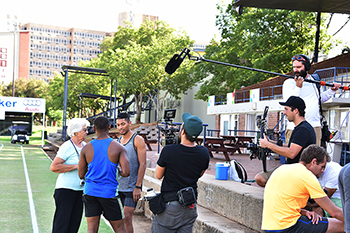Latest News Archive
Please select Category, Year, and then Month to display items
02 January 2025
|
Story Gerda-Marie van Rooyen
|
Photo Supplied
 Leading the research in South Africa is Prof Linus Franke from the Department of Soil, Crop and Climate Sciences.
Leading the research in South Africa is Prof Linus Franke from the Department of Soil, Crop and Climate Sciences.
Scientists are actively pursuing the successful breeding of diploid hybrid potatoes from inbred lines. This is expected to revolutionise potato breeding as it holds the key to rapid genetic progress. It will introduce new varieties for commercialisation through seed. Currently, existing potato variants have a gene that renders self-pollinated seeds infertile.
Prof Linus Franke, an academic in the Department of Soil, Crop and Climate Sciences at the UFS, is leading the research in South Africa. “This technology allows the production of genetically uniform potato seed that is easy to transport and largely disease-free.” He says this differs from conventional breeding whereby only vegetative propagation is possible due to tetraploid varieties in potatoes. It also risks carrying pests and diseases from one generation to the next – leading to the accumulation of pests and diseases with each round of multiplication.
Seed innovation
Prof Franke explains that Solynta BV, a seed company based in the Netherlands that produces potato varieties that can be grown from seed, has included South Africa in their research efforts because it is one of Africa’s largest producers and exporters. Through his academic relationship with Wageningen University and Research, a Dutch institution renowned for its agricultural endeavours and food production, the UFS became involved in researching hybrid potatoes grown from seed.
Diploid seeds containing two sets of chromosomes allow easier gene manipulation to increase predictability and speedier genetic progress. The breeding approach enables the incorporation of tolerance to pests, diseases, abiotic stresses (cold, heat, drought) and other desired genetic traits.
Although Prof Franke is optimistic about this research, he is not blind to disadvantages. “Potato seeds are tiny and have little energy reserves, making it harder to grow potatoes from seed than from tubers.” He says potatoes from seed will take longer to cultivate than tubers, as farmers need to grow plantlets from seeds first, adding six weeks to the growing period. “It is possible that commercial farmers can grow potatoes directly from seed. Alternatively, perhaps more likely, specialised growers will produce tubers of potatoes from seed; these tubers are then sold as seed tubers to other potato farmers, who then continue their normal practices of producing potatoes for the market from tubers.”
Financial benefits
Prof Franke says farmers have reason to get excited. “Seed potatoes will reduce input costs, as varieties with enhanced tolerance to pests and diseases require less pesticides. Planting one hectare of potatoes requires three to four tonnes of potato tubers, but only one 25 g packet of potato seeds.” Since potatoes are a more valuable commodity than maize, this technology might also increase farmers’ income potential.
NBC tells Wayde’s story
2015-11-02
 The film crew from NBC Olympics
filming Wayde van Niekerk (centre, in grey clothes)
during a practice session at Pellies Park on the
Bloemfontein Campus of the UFS.
On the left is Ans Botha, Van Niekerk’s coach.
Photo: Charl Devenish |
The Kovsie star Wayde van Niekerk stands an excellent chance of shining at the 2016 Olympics and has a remarkable story behind his success.
This is why NBC Olympics, a division of the American broadcasting network NBC, selected the athlete from the University of the Free State (UFS) to do a special insert for the Olympics in Rio de Janeiro.
A film crew from NBC visited the City of Roses and the Bloemfontein Campus of the UFS on Monday 26 and Tuesday 27 October 2015 to film the insert. The feature will be screened on NBC Olympics’ platforms during and leading up to the Olympics next year.
One of four stars
Van Niekerk was one of four athletes used by the crew to film inserts on. The others were the South African swimmer Chad le Clos, the Kenyan 800 m athlete David Rudisha, and Ethiopian middle- and long-distance athlete Genzebe Dibaba.
The crew interviewed Van Niekerk and his coach Ans Botha, and also paid a visit to Pellies Park during one of his training sessions.
According to Tom Davidson, feature producer at NBC Olympics, the piece about Van Niekerk will be about three minutes long.
“We do a pretty good job of picking good stories, but it is up to the athletes to get there,” Davidson said.
“We think Wayde has a good shot at being in the finals of the 400 m at the Olympics.”
Van Niekerk won a gold medal in a time of 43.48 s at the World Championships in Beijing during August 2015 and set a new South African record for a third time and a new African record for a second time this year in the process.
Beijing success propels Wayde onto NBC radar
“Wayde’s performance in Beijing certainly propelled him onto our radar,” said Davidson.
“He beat former World and Olympic champions like Kirani James and LaShawn Merritt.”
He feels that Van Niekerk is also very young and still at university.
And Botha makes his story even more interesting.
“It is not every day that you see a 74-year old great-grandmother coaching a world champion.”